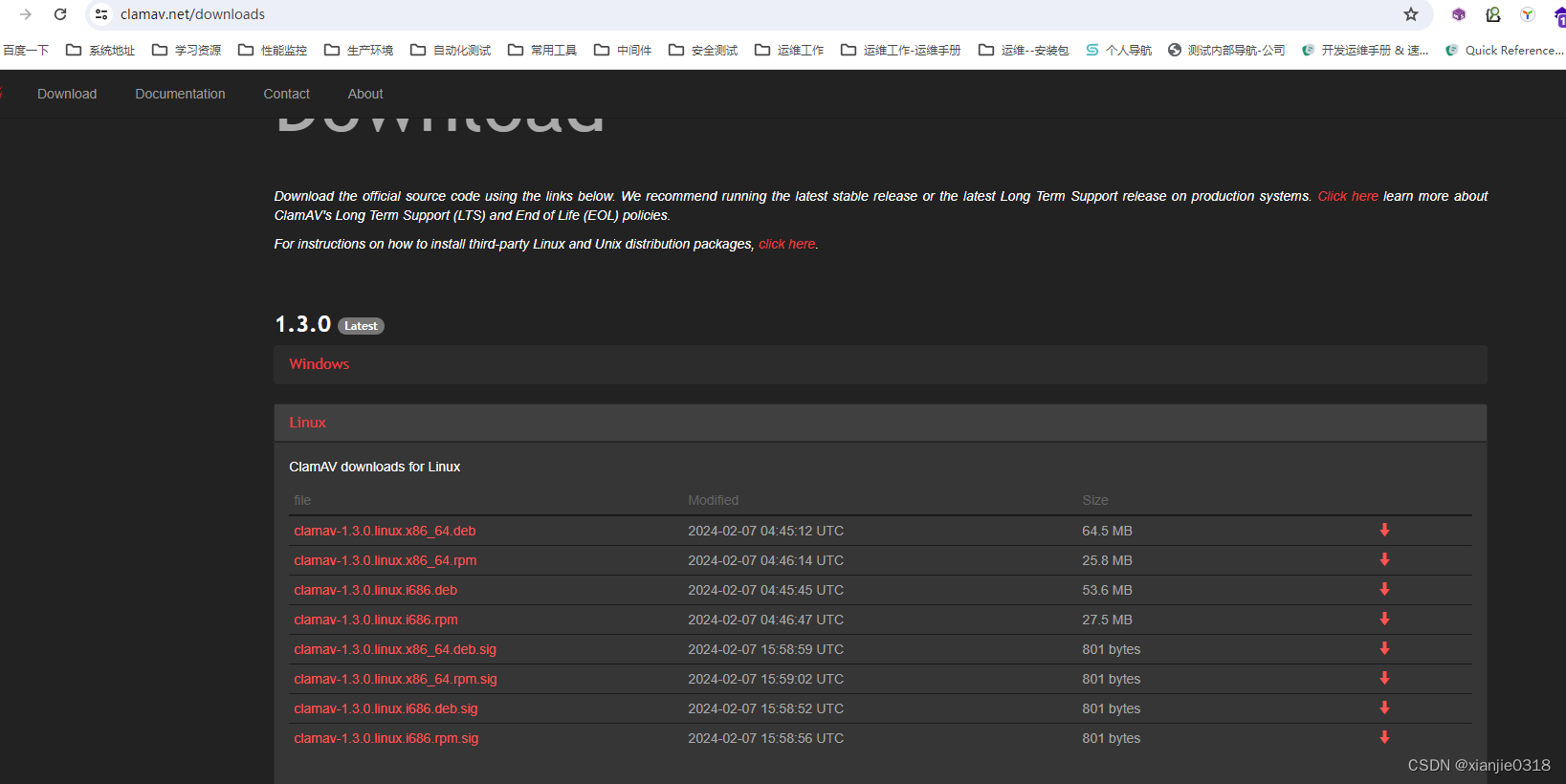Clam AntiVirus(ClamAV)是免费而且开放源代码的防毒软件,软件与病毒码的更新皆由社群免费发布。ClamAV在命令行下运行,它不将杀毒作为主要功能,默认只能查出系统内的病毒,但是无法清除。需要用户自行对病毒文件进行处理。
在线安装
# ubuntu
sudo apt install clamav clamav-daemon -y
# centos
sudo yum install clamav clamav-update -y
离线安装
1、官网下载对应的软件包
ClamAVNet https://www.clamav.net/downloads
https://www.clamav.net/downloads 
2、将下载的软件包上传到服务器后使用rpm/dpkg命令进行安装,软件包里面已经将相关依赖这些打包好了,直接安装就行。
rpm -ivh --prefix=/usr/local/clamav clamav-1.3.0.linux.x86_64.rpm
dpkg -i --instdir=/usr/local/clamav clamav-1.3.0.linux.x86_64.deb 
手动更新病毒库
病毒库位置:/var/lib/clamav/*
1、暂时停止服务:sudo systemctl stop clamav-freshclam
2、运行freshclam:sudo freshclam 或者直接: /usr/bin/freshclam
3、重新启动服务:sudo systemctl start clamav-freshclam
注:
复制/usr/local/etc/freshclam.conf并注释掉:
#Example
使用说明:
1、clamscan用法
clamscan [options] [file/directory/-]
--help -h Show this help
--version -V Print version number
--verbose -v Be verbose
--archive-verbose -a Show filenames inside scanned archives
--debug Enable libclamav's debug messages
--quiet Only output error messages
--stdout Write to stdout instead of stderr. Does not affect 'debug' messages.
--no-summary Disable summary at end of scanning
--infected -i Only print infected files
--suppress-ok-results -o Skip printing OK files
--bell Sound bell on virus detection
--tempdir=DIRECTORY Create temporary files in DIRECTORY
--leave-temps[=yes/no(*)] Do not remove temporary files
--gen-json[=yes/no(*)] Generate JSON metadata for the scanned file(s). For testing & development use ONLY.
JSON will be printed if --debug is enabled.
A JSON file will dropped to the temp directory if --leave-temps is enabled.
--database=FILE/DIR -d FILE/DIR Load virus database from FILE or load all supported db files from DIR
--official-db-only[=yes/no(*)] Only load official signatures
--fail-if-cvd-older-than=days Return with a nonzero error code if virus database outdated.
--log=FILE -l FILE Save scan report to FILE
--recursive[=yes/no(*)] -r Scan subdirectories recursively
--allmatch[=yes/no(*)] -z Continue scanning within file after finding a match
--cross-fs[=yes(*)/no] Scan files and directories on other filesystems
--follow-dir-symlinks[=0/1(*)/2] Follow directory symlinks (0 = never, 1 = direct, 2 = always)
--follow-file-symlinks[=0/1(*)/2] Follow file symlinks (0 = never, 1 = direct, 2 = always)
--file-list=FILE -f FILE Scan files from FILE
--remove[=yes/no(*)] Remove infected files. Be careful!
--move=DIRECTORY Move infected files into DIRECTORY
--copy=DIRECTORY Copy infected files into DIRECTORY
--exclude=REGEX Don't scan file names matching REGEX
--exclude-dir=REGEX Don't scan directories matching REGEX
--include=REGEX Only scan file names matching REGEX
--include-dir=REGEX Only scan directories matching REGEX
--bytecode[=yes(*)/no] Load bytecode from the database
--bytecode-unsigned[=yes/no(*)] Load unsigned bytecode
**Caution**: You should NEVER run bytecode signatures from untrusted sources.
Doing so may result in arbitrary code execution.
--bytecode-timeout=N Set bytecode timeout (in milliseconds)
--statistics[=none(*)/bytecode/pcre] Collect and print execution statistics
--detect-pua[=yes/no(*)] Detect Possibly Unwanted Applications
--exclude-pua=CAT Skip PUA sigs of category CAT
--include-pua=CAT Load PUA sigs of category CAT
--detect-structured[=yes/no(*)] Detect structured data (SSN, Credit Card)
--structured-ssn-format=X SSN format (0=normal,1=stripped,2=both)
--structured-ssn-count=N Min SSN count to generate a detect
--structured-cc-count=N Min CC count to generate a detect
--structured-cc-mode=X CC mode (0=credit debit and private label, 1=credit cards only
--scan-mail[=yes(*)/no] Scan mail files
--phishing-sigs[=yes(*)/no] Enable email signature-based phishing detection
--phishing-scan-urls[=yes(*)/no] Enable URL signature-based phishing detection
--heuristic-alerts[=yes(*)/no] Heuristic alerts
--heuristic-scan-precedence[=yes/no(*)] Stop scanning as soon as a heuristic match is found
--normalize[=yes(*)/no] Normalize html, script, and text files. Use normalize=no for yara compatibility
--scan-pe[=yes(*)/no] Scan PE files
--scan-elf[=yes(*)/no] Scan ELF files
--scan-ole2[=yes(*)/no] Scan OLE2 containers
--scan-pdf[=yes(*)/no] Scan PDF files
--scan-swf[=yes(*)/no] Scan SWF files
--scan-html[=yes(*)/no] Scan HTML files
--scan-xmldocs[=yes(*)/no] Scan xml-based document files
--scan-hwp3[=yes(*)/no] Scan HWP3 files
--scan-onenote[=yes(*)/no] Scan OneNote files
--scan-archive[=yes(*)/no] Scan archive files (supported by libclamav)
--alert-broken[=yes/no(*)] Alert on broken executable files (PE & ELF)
--alert-broken-media[=yes/no(*)] Alert on broken graphics files (JPEG, TIFF, PNG, GIF)
--alert-encrypted[=yes/no(*)] Alert on encrypted archives and documents
--alert-encrypted-archive[=yes/no(*)] Alert on encrypted archives
--alert-encrypted-doc[=yes/no(*)] Alert on encrypted documents
--alert-macros[=yes/no(*)] Alert on OLE2 files containing VBA macros
--alert-exceeds-max[=yes/no(*)] Alert on files that exceed max file size, max scan size, or max recursion limit
--alert-phishing-ssl[=yes/no(*)] Alert on emails containing SSL mismatches in URLs
--alert-phishing-cloak[=yes/no(*)] Alert on emails containing cloaked URLs
--alert-partition-intersection[=yes/no(*)] Alert on raw DMG image files containing partition intersections
--nocerts Disable authenticode certificate chain verification in PE files
--dumpcerts Dump authenticode certificate chain in PE files
--max-scantime=#n Scan time longer than this will be skipped and assumed clean (milliseconds)
--max-filesize=#n Files larger than this will be skipped and assumed clean
--max-scansize=#n The maximum amount of data to scan for each container file (**)
--max-files=#n The maximum number of files to scan for each container file (**)
--max-recursion=#n Maximum archive recursion level for container file (**)
--max-dir-recursion=#n Maximum directory recursion level
--max-embeddedpe=#n Maximum size file to check for embedded PE
--max-htmlnormalize=#n Maximum size of HTML file to normalize
--max-htmlnotags=#n Maximum size of normalized HTML file to scan
--max-scriptnormalize=#n Maximum size of script file to normalize
--max-ziptypercg=#n Maximum size zip to type reanalyze
--max-partitions=#n Maximum number of partitions in disk image to be scanned
--max-iconspe=#n Maximum number of icons in PE file to be scanned
--max-rechwp3=#n Maximum recursive calls to HWP3 parsing function
--pcre-match-limit=#n Maximum calls to the PCRE match function.
--pcre-recmatch-limit=#n Maximum recursive calls to the PCRE match function.
--pcre-max-filesize=#n Maximum size file to perform PCRE subsig matching.
--disable-cache Disable caching and cache checks for hash sums of scanned files.
--基本扫描
##扫描文件
[root@localhost ~]# clamscan targetfile
##递归扫描home目录,并且记录日志
[root@localhost ~]# clamscan -r -i /home -l /var/log/clamav.log
##递归扫描home目录,将病毒文件删除,并且记录日志
[root@localhost ~]# clamscan -r -i /home --remove -l /var/log/clamav.log
##扫描指定目录,然后将感染文件移动到指定目录,并记录日志
-----重点扫描目录
[root@localhost ~]# clamscan -r -i /home --move=/tmp/clamav -l /var/log/clamav.log
clamscan -r -i /etc --max-dir-recursion=5 -l /var/log/clamav-etc.log
clamscan -r -i /bin --max-dir-recursion=5 -l /var/log/clamav-bin.log
clamscan -r -i /usr --max-dir-recursion=5 -l /var/log/clamav-usr.log
clamscan -r -i /var --max-dir-recursion=5 -l /var/log/clamav-var.log
重点扫描报告
---------- SCAN SUMMARY -----------
Known viruses: 9141451 #已知病毒
Engine version: 0.102.4 #软件版本
Scanned directories: 498 #扫描目录
Scanned files: 738 #扫描文件
Infected files: 4 #感染文件!!!
Data scanned: 530.25 MB #扫描数据
Data read: 14131.60 MB (ratio 0.04:1) #数据读取
Time: 203.805 sec (3 m 23 s) #扫描用时










